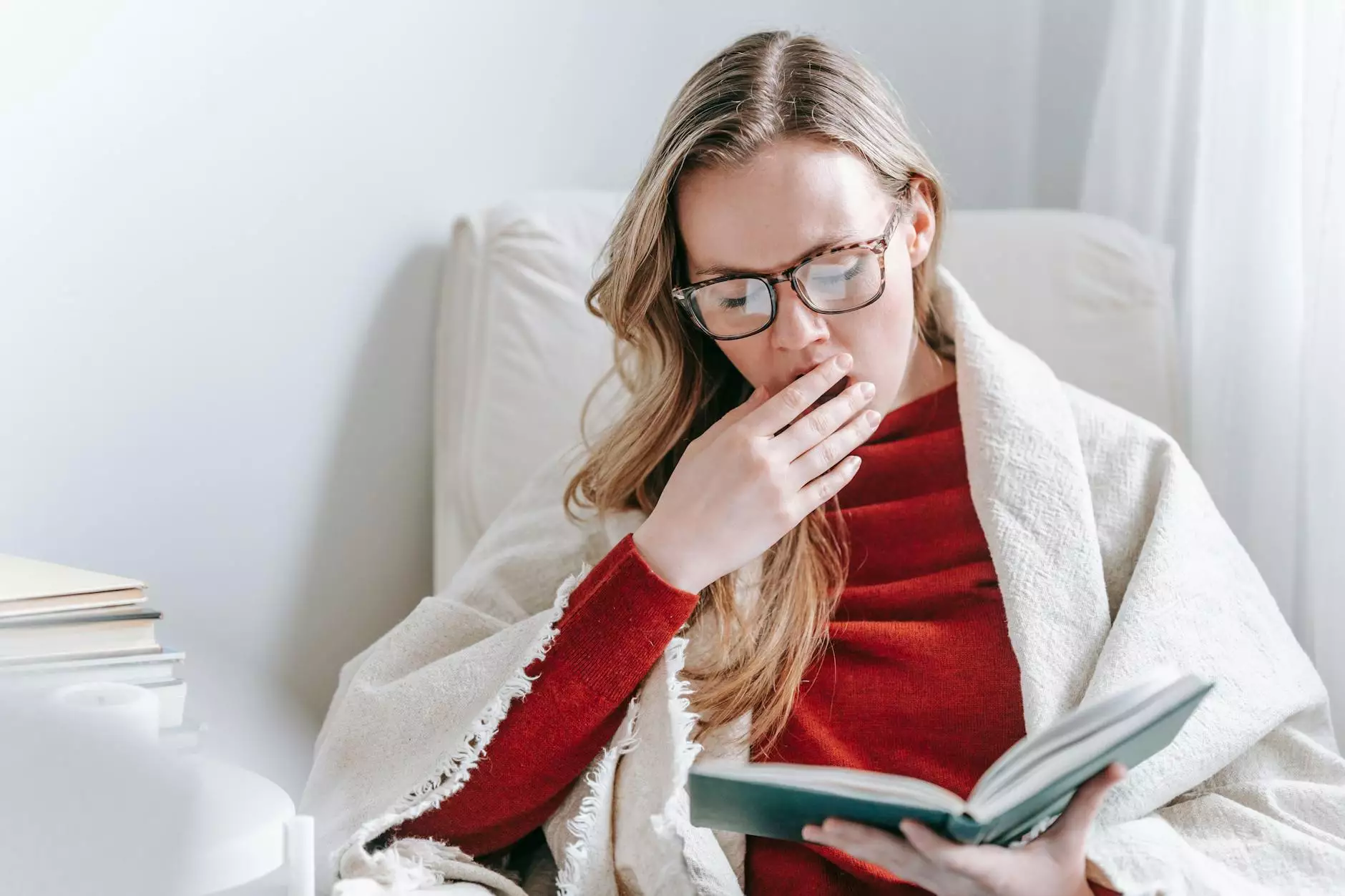The Science Behind Sleep Wellness

Welcome to Sleep Wellness Doctor, your go-to source for all things related to achieving optimal sleep health! As sleep specialists in the field of health and medical care, we are dedicated to helping you understand the science behind a good night's sleep and providing you with practical tips to improve your sleep quality. Whether you struggle with insomnia, sleep disorders, or simply want to enjoy a well-rested life, our comprehensive guide is here to support you.
Achieving Optimal Sleep Health
Sleep is an essential component of overall well-being. Quality sleep not only rejuvenates our bodies but also contributes to improved cognitive function, emotional well-being, and physical health. However, in today's fast-paced world, many individuals struggle to get the recommended amount of sleep each night.
At Sleep Wellness Doctor, we believe that understanding the importance of a good night's sleep is the first step towards optimizing your sleep health. Our team of experts has dedicated years of research to unraveling the science behind sleep and developing effective strategies to help you achieve rejuvenating sleep every night.
Identifying Common Sleep Issues
In order to address sleep-related concerns, it is crucial to identify the most common sleep issues that individuals face. Sleep disorders such as insomnia, sleep apnea, restless leg syndrome, and narcolepsy can greatly impact the quality of your sleep and overall well-being. Our sleep specialists at Sleep Wellness Doctor have the knowledge and expertise to diagnose and treat these conditions, helping you regain control of your sleep health.
Insomnia: Understanding the Sleep Thief
Insomnia is a prevalent sleep disorder characterized by persistent difficulty falling asleep or staying asleep. Individuals with insomnia often experience fatigue, irritability, and a decreased ability to concentrate during the day. At Sleep Wellness Doctor, we employ a multidimensional approach to treating insomnia, including cognitive behavioral therapy, sleep hygiene practices, and, if necessary, medication management tailored to your specific needs.
Sleep Apnea: The Silent Disruptor
Sleep apnea is a serious condition where breathing repeatedly stops and starts during sleep. This condition not only disrupts your sleep but can also lead to various health complications if left untreated. Our sleep specialists utilize advanced techniques such as continuous positive airway pressure (CPAP) therapy to effectively manage sleep apnea and ensure a restful night's sleep.
Restless Leg Syndrome: The Unsettled Sleeper
Restless leg syndrome causes an irresistible urge to move your legs, often accompanied by uncomfortable sensations. This can significantly impair your ability to fall and stay asleep. Our experts at Sleep Wellness Doctor employ a combination of medications and lifestyle modifications to alleviate these symptoms and improve your sleep quality.
Narcolepsy: Overcoming Daytime Sleepiness
Narcolepsy is a neurological disorder that affects the brain's ability to regulate sleep-wake cycles. Individuals with narcolepsy often experience excessive daytime sleepiness, sudden loss of muscle tone (cataplexy), hallucinations, and sleep paralysis. Our sleep specialists are well-versed in managing narcolepsy through personalized treatment plans that include medications and lifestyle modifications.
Optimizing Your Sleep Environment
Apart from addressing specific sleep disorders, optimizing your sleep environment is crucial for achieving restorative sleep. Here are some key factors to consider:
Comfortable Mattress and Pillows
Investing in a comfortable mattress and pillows that support your body's natural curves can greatly enhance your sleep comfort. Our team at Sleep Wellness Doctor recommends selecting a mattress and pillows that suit your personal preferences and provide proper spinal alignment.
Creating a Relaxing Atmosphere
Transform your bedroom into a peaceful haven by eliminating sources of noise, keeping the room at a comfortable temperature, and using blackout curtains to block out external light. Creating a calming atmosphere can help cue your body for sleep and promote deep, uninterrupted rest.
Establishing a Bedtime Routine
Developing a consistent bedtime routine signals to your body that it's time to unwind and prepare for sleep. Incorporate relaxing activities such as reading a book, taking a warm bath, or practicing meditation to help transition from the busyness of the day to a state of rest.
Avoiding Stimulants and Electronics
Limiting the consumption of caffeine, nicotine, and alcohol close to bedtime can help prevent sleep disturbances. Additionally, it's advisable to avoid using electronic devices, such as smartphones and laptops, as the blue light emitted can interfere with your body's natural sleep-wake cycle.
The Role of Nutrition in Sleep Quality
While creating an optimal sleep environment is essential, proper nutrition also plays a significant role in promoting healthy sleep. Certain foods and beverages can positively impact your sleep quality, while others can disrupt it. Here are some dietary considerations:
Encouraging Sleep-Friendly Foods
Foods rich in tryptophan, magnesium, and vitamins B6 and C can help promote quality sleep. Incorporate sources of tryptophan, such as turkey, nuts, and seeds, into your diet. Similarly, magnesium-rich foods like leafy greens, avocados, and whole grains can contribute to restful sleep. Additionally, foods high in vitamins B6 and C, such as bananas and citrus fruits, can aid in the synthesis of sleep-regulating neurotransmitters.
Avoiding Sleep Disruptors
Certain foods and beverages can interfere with sleep quality and should be avoided, especially close to bedtime. These include caffeinated beverages, sugary foods, spicy meals, and heavy or greasy foods. Opt for herbal teas, light snacks, and balanced meals to support a peaceful night's sleep.
Fostering Healthy Lifestyle Habits
Adopting a holistic approach towards sleep health involves fostering healthy lifestyle habits that support your overall well-being. Consider incorporating the following practices into your daily routine:
Regular Exercise for Better Sleep
Engaging in regular physical exercise, such as walking, jogging, or yoga, can improve your sleep quality. Exercise promotes the release of endorphins, reduces stress levels, and helps regulate sleep-wake cycles. Aim for at least 30 minutes of moderate-intensity exercise each day for better sleep.
Stress Management Techniques
Chronic stress can significantly impact sleep quality. Incorporate stress management techniques into your daily routine to promote relaxation and better sleep. These may include deep breathing exercises, practicing mindfulness or meditation, keeping a journal, or engaging in hobbies that bring you joy.
Maintaining a Consistent Sleep Schedule
Establishing a consistent sleep schedule, even on weekends, helps regulate your body's internal clock. Aim to go to bed and wake up at the same time every day to promote a consistent sleep-wake cycle. Over time, this will contribute to improved sleep quality.
Limiting Naps for Better Nighttime Sleep
If you struggle with sleep, it's best to limit daytime napping, especially later in the afternoon. Long or late naps can disrupt your sleep drive and make it harder to fall asleep at night. If necessary, opt for short power naps earlier in the day to boost alertness.
Conclusion
Sleep Wellness Doctor is your ultimate resource for achieving optimal sleep health. Our team of sleep specialists in the field of health and medical care is dedicated to providing you with scientific knowledge, practical tips, and personalized support to improve your sleep quality. By addressing common sleep issues, optimizing your sleep environment, considering sleep-friendly nutrition, and fostering healthy lifestyle habits, you can enjoy the benefits of restorative sleep and wake up refreshed, rejuvenated, and ready to conquer the day.
sleepwellnessdoctor.com








